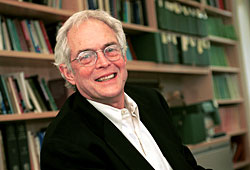Information Theory Community Gathers for Shannon Memorial Lecture, Endowed Chair Annoucement
San Diego, Calif., Sept. 28, 2011 — Stanford University’s Thomas M. Cover, the Kowh-Ting Li Professor of Electrical Engineering and Statistics, presented UC San Diego’s ninth annual Claude E. Shannon Memorial Lecture at the California Institute for Telecommunications and Information Technology (Calit2) Auditorium last week before an assembly of students, faculty and members of the community.
|
Each year, the UCSD Center for Magnetic Recording Research, with support from Calit2 and its Information Theory and Applications Center (ITA), invites a guest speaker to lecture in honor of the late information theorist. Cover’s lecture detailed the St. Petersburg Paradox, which asks how much an individual would be willing to pay to receive an infinite expected amount of money (e.g. pay $100 to receive a payoff of $2, $4, $8... dollars with respective probabilities ½, ¼...). Although Shannon did not address this question, Cover — who is known for his work in information theory, pattern recognition and learning — explained how his general advocacy of growth optimality in a famous talk he presented at the Massachusetts Institute of Technology in 1966 provides a natural resolution of the paradox.
Information theory is a branch of applied mathematics and electrical engineering that seeks to quantify information. Shannon was a forerunner of the field, which has since broadened from its emphasis on signal processing to include applications in various forms of data analysis, such as statistical inference, cryptography and quantum computing.
“As theoretical as information theory is, it doesn’t live in its own world,” says Calit2 Divisional Director Ramesh Rao. “Most things we use every day originate from this field.”
|
The chair has been endowed with funds raised in honor and memory of Wolf’s lifetime of professional achievements in research, teaching and student mentoring. It was announced at a ceremony featuring tributes from Wolf’s former colleagues and students (affectionately known as the “Wolf Pack”), as well as members of his family.
Said Charles Tu, associate dean of the UCSD Jacobs School of Engineering: “At Jack’s memorial service we celebrated his life as a human being. Today we are celebrating his life as a faculty member. This chair will be a tool for recruiting and retaining outstanding faculty members. Today is a happy occasion.”
Calit2-affiliated ECE Professor Shaya Fainman called the endowment “a huge help to keep UCSD one of the top schools in the world.”
“We want to continue to find ways to strengthen the ties between electrical and computer engineering and industry,” he added.
“I hope this chair goes to someone who loved teaching as much as Jack did, because it would be a fitting tribute,” remarked Toby Wolf, Jack Wolf's wife of 56 years. “Jack’s main emphasis his entire life was on teaching and research having to do with teaching. Everything always related back to that."
Related Links
Center for Magnetic Recording Research
Media Contacts
Tiffany Fox, (858) 246-0353, tfox@ucsd.edu


.jpg)